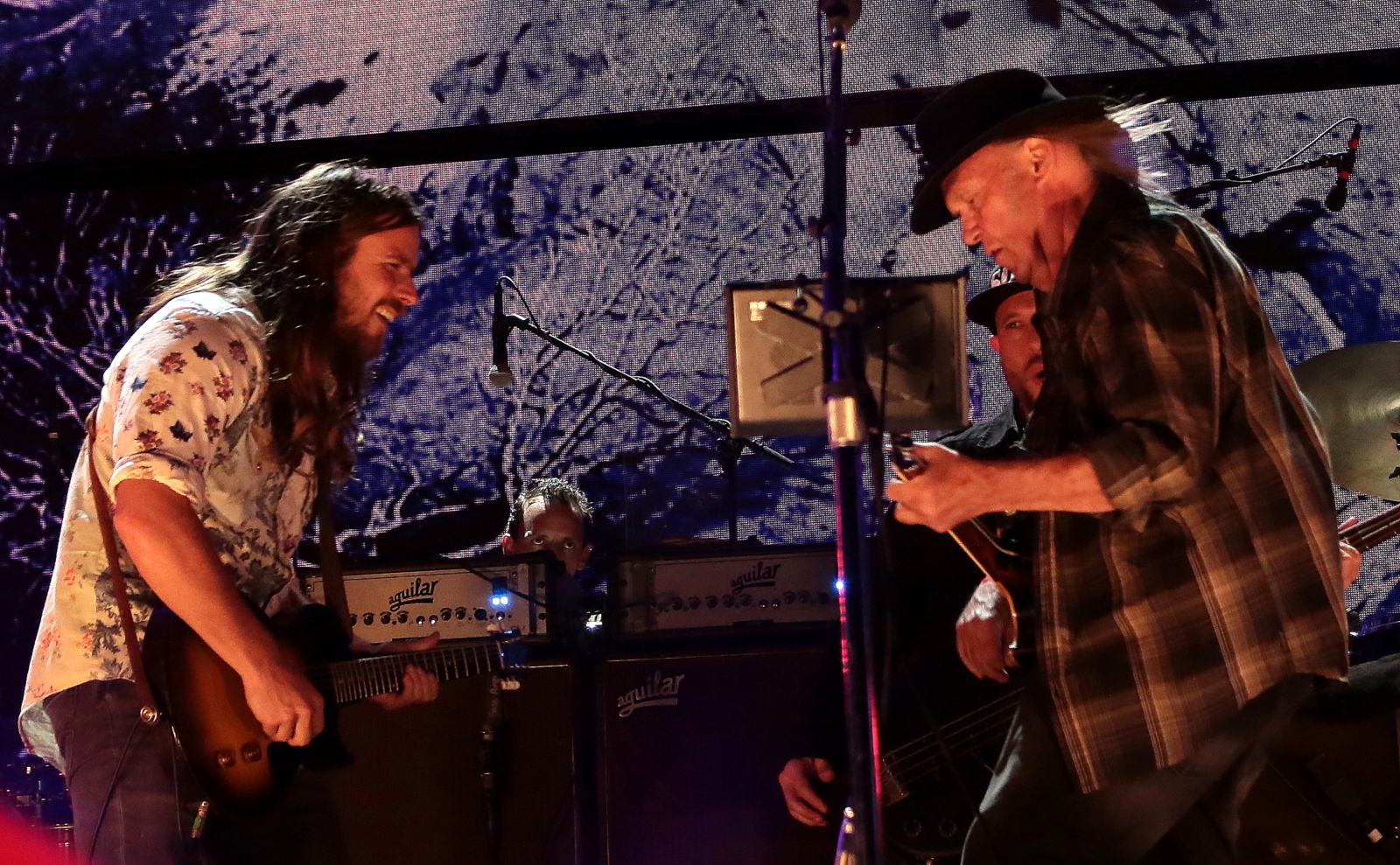“I Didn’t Bring a Band”: The Origins of Neil Young & Promise of the Real

Lukas Nelson and Neil Young (l-r) performing with Promise of the Real, Farm Aid 2017 (photo by John Patrick Gatta)
The following article originally appeared as the Editor’s Note for the July/August 2019 issue of Relix, which featured a cover story conversation between Lukas Nelson and Relix publisher Peter Shapiro. In anticipation of this weekend’s Farm Aid 2019, which will take place at Wisconsin’s Alpine Valley Music Theatre Sept. 21, we present the story of the origins of Neil Young’s ongoing collaboration with Nelson’s Promise of the Real, both of whom will be playing at this year’s Farm Aid.
The day before flying down to Bonnaroo 2019 was a whirlwind. I not only closed out the Thursday edition of the Bonnaroo Beacon daily newspaper, but I also joined Publisher Peter Shapiro on the Lukas Nelson & Promise of the Real tour bus. The band shared many entertaining and enlightening moments, including this account from drummer Anthony LoGerfo describing the winding road through which the group came to record and tour with Neil Young (it also includes a nod to Young’s manager Elliot Roberts, who passed away in June).
In 2009, the year we formed, we played Farm Aid. We’ve played Farm Aid every year since we started. That was something we said—“We’ll never miss a Farm Aid.” So we go on at one in the afternoon and after we’re done, Neil’s rehearsing with his band. Lukas and I are hiding behind a gate because it’s in his compound and we’re listening on the other side of the fence. He’s jamming “Down by the River” and after he finishes, he comes out—we didn’t expect him to walk out—and he starts walking towards us with Ben Keith [Young’s longtime bandmate who died in 2010]. They came up, and Neil said, “Hey, what’s the name of your band?” We told him and he said, “Yeah, I heard you guys earlier, I liked it. You sound pretty cool.” Then we said, “Did you hear? We played your song ‘L.A.’” He hadn’t played that since 1976 on the Time Fades Away tour and he responded, “That’s what got my attention. I said, ‘Shit, is that my song?’” So we had a nice conversation—Ben Keith was really cool—and then it was, “OK, we’ll see you later.”
When we played the next year at Farm Aid, he was on the stage watching with Willie. We hadn’t seen him in a year, and this time he invited us to come to the Bridge School [Benefit], which was a month later. So we went to the Bridge School—that’s when he reunited with Buffalo Springfield—and Elliot Roberts, his manager, came up to us toward the end of the Springfield set and said, “Neil wants to see you guys after the show.” He was sitting in his dressing room alone, and he was full of excitement about the band, the performance he had seen at Farm Aid, how we record and what we’re about. He kind of shared his wisdom with us. We sat with him for over an hour that night. We drank beer together, and we talked a lot about music and life, and he was really cool
to us. Then he invited us to go to his studio and master our record, Wasted, and do it at a high resolution. So we went to the studio, which was at his ranch at the time, and we worked, and he didn’t even show up, which I thought was really respectful. He just let us do our thing, he didn’t come in and try to say anything.
Then, for the next two years, we’d see him. He’d be at Farm Aid and at Bridge, and we’d talk about our record. Then one day we’re doing a concert with Willie and Neil, protesting the Nebraska Keystone Pipeline. We were sitting on this bus with Willie drinking coffee, then Neil comes on and he says, “Hey, what’s up boys?” Then he goes over and talks to Willie for a while, looks back at us with his Neil look and goes, “So I didn’t bring a band. I was kinda hoping you guys would back me up tonight.”
Our response of course was “Fuck yeah, we’ll back you up!” He said, “OK, come by my bus around 4 p.m., we’ll run some songs.” We stopped by and we ran six or seven tracks, just acoustic. Then we went out and played them electric for 10,000, 15,000 people, and that was the first time. You could see the excitement in his face and our faces. He emailed us a week later and was like, “Come to Bridge School.” So we did Bridge School together and right after that, he asked us to make a record with him, The Monsanto Years, the protest record. And that was the beginning of the Neil Young and Promise of the Real relationship.
This article originally appears in the July/August 2019 issue of Relix. For more features, interviews, album reviews and more, subscribe here.



















